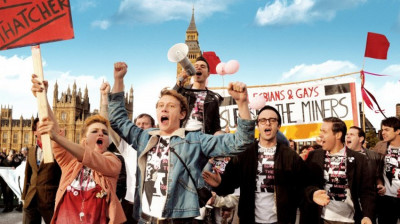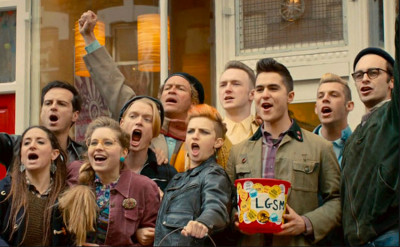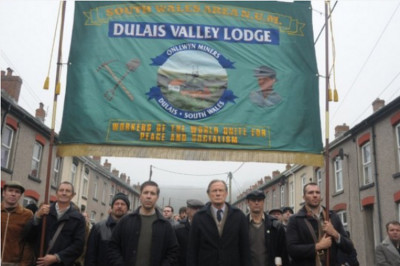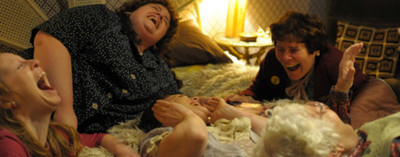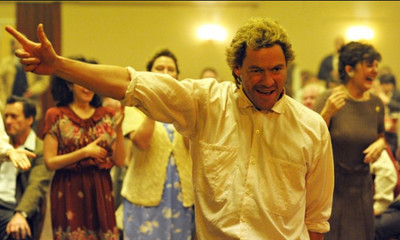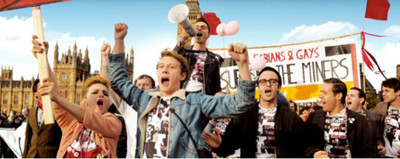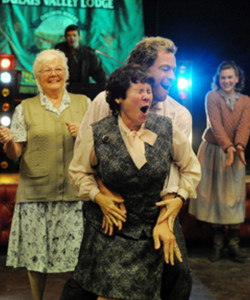There’s nothing like a quietly powerful moment in history to make the most impactful statement on film. PRIDE is one such film. Set during the National Union of Mineworkers strike of 1984-85, PRIDE not only sheds light on the working class struggles in a Margaret Thatcher-era Great Britain, but tells the two-pronged story of discrimination and struggle for mineworkers and the LGBT community.
Margaret Thatcher was known for taking a hard line with unions, deeming them a threat to the power of the State as a result of the successful strikes in the 1970’s by the National Union of Mineworkers which effectively brought the government to its knees. Thatcher was determined not to have that happen on her watch and not only systematically forced the miners into yet another strike in 1984, but then with almost military precision, oversaw a campaign against them, using the media, militarized police and other tactics, effectively isolating the unions workers from society and the world. But what Thatcher didn’t count on was another battle being waged; that of the LGBT community in their pursuit of gay rights.
While the gay rights battle may have been receiving less press and publicity than the mineworkers’ strike, within the Thatcher regime panic set in with the ever-increasing “epidemic” of AIDS. Governmental homophobia didn’t help and trickled down into police harassment both verbal and physical of gays and lesbians during demonstrations. But something miraculous happened, something that brought out the best of humanity. The LGBT community, seeing the mineworkers as fighting a similar battle of discrimination and seeking equal rights, championed the battle of the striking workers, fundraising and bringing them much needed aid, and although slow and tough going – including fighting the prejudice of many striking and starving miners – the two groups came together as one, culminating in a glorious united front during the 1985 gay pride parade.
PRIDE is told through the eyes of Joe, a young man questioning his own sexuality. Inadvertently pulled into the midst of a gay pride parade by activist Mark, Joe finds a comaraderie he has never known and with wide-eyed wonder becomes the photographer of the group now known as LGSM (Lesbian and Gays Support the Miners). Of course, while enjoying his newfound freedom and new life experiences, Joe is also lying to his parents and not attending an alleged culinary school. Along the way we meet other core members of LGSM as well as union representatives and their families in the village in Wales being helped by the LGSM.
Interwoven throughout is balanced political commentary told not from the outside looking in, but from the heart of the maelstrom. Activism is celebrated and championed by gay and straight, men and women, young and old alike. Left and right wing philosophies collide but together director Matthew Warchus and scribe Stephen Beresford prevail in presenting a rousing portrait of a key event in history, so much so as to stir feelings of activism and solidarity within the watching audience. Applause-worthy is that they introduce some 20 primary characters who are integral to the unfolding events, each with fully fleshed arcs.
The truth and power of the story itself and the real life events and people on which this is based is a testament to the best of humanity. And while also showing us the worst, it buttresses the ideology of united we stand, divided we fall; as even though battles may be lost, the war is won. People connect, bond and triumph. PRIDE is a telling example of the indomitable human spirit.
So well crafted, you will laugh until you cry and then you’ll cry and agonize with each battle, each uphill struggle from both camps. And the waterworks will freely flow as you watch the climactic 1985 gay pride parade as bus upon bus of miners arrive to march along their LGBT brethren. People are people; equality is equality; basic rights are basic rights. Interesting is that the character studies surrounding this chapter of history rise above the issues of laborers/workers/working class, gays, male, female, feminist, etc. Although the scripted dialogue repeatedly reminds us of the LGSM movement itself, you quickly forget about that and just see people helping people. Beresford finds a great balance within the script and the specific characters in showing both sides of the argument, both sides of the coin, as to public sentiments. Where he truly excels, however, is in capturing the inherent humor of the situation which is then beautifully translated with superb performances from a gifted British cast. The fish out of water scenes on both sides of the fence are hilarious – particularly when the ladies of Wales come to London to check out the gay clubs! And just get ready for one of the most hilarious scenes you’ll see all year on film as Imelda Staunton’s Hefina finds a dildo and gay porn magazines in Jonathan’s house while oohing and aahing over the Laura Ashley wallpaper on the bedroom walls. Your sides will ache with laughter. The emotion of PRIDE is so strong, so powerful; and that emotion is fueled by the performances which are all superb. I can easily see a Golden Globe Best Ensemble Cast for PRIDE.
And what about this cast? The cream of the crop. Bill Nighy is at his mightiest when quiet and somewhat introverted, as he is here. As Cliff, Nighy serves as a calm voice of reason amidst an ever darkening storm. As Hefina, Imelda Staunton is a kick in the ass with a fire and maternal presence that just wafts over the other characters like a protective coat or blanket. It’s a wonderful effect that blankets the film thanks to her.
And then you’ve got George Mackay! I first took note of Mackay back when he did ‘The Boys Are Back” with Clive Owen and again recently with “How I Live Now.” He lights up the screen with ebullience and inquisitiveness. Here, as Joe, he just reels us in with a wide-eyed innocence that is infectious, joyous. It’s the kind of exuberance that everyone feels when they’re young and think they can change the world. Through Joe’s eyes, we get to live that. Mackay is the embodiment of that as he delivers a full character arc.
Ben Schnetzer provides a commanding intensity as LGSM leader Mark. Schnetzer brings a false bravura to Mark that covers his own fears and insecurities about the possibility of having AIDS. The emotion is raw and palpable. (Unfortunately, Mark only lived a short time after the 1985 gay pride parade but during that time he tirelessly campaigned for equal rights for all on many fronts.) Unforgettable performance comes courtesy of Andrew Scott who, as mild-mannered bookstore owner and quieter activist Gethin finds his voice in the battle for equality and suffers the consequences of so doing. Scott brings a gravitas to Gethin that will put your heart in your throat.
Jessica Gunning dazzles with cheery feistiness as Sian, the wife of a striking worker and a woman trying to find a purpose in her life. It’s through Jonathan, the most flamboyant member of LGSM, that in real life Sian does indeed find that purpose for as the end notes tell us, she eventually returned to school, got her degree and went on to serve in Parliament. And then there’s Dominic West who, as Jonathan, just slays me with the high-octane energy and zest for life and above all for living. West makes us feel that energy and life force by just watching him. (Jonathan, who bears the burden of being the second man in London to be diagnosed as HIV+, is still alive and kicking today.)
Constructed by Warchus with an almost Altman-esque ensemble design, it’s as if the camera is a character, interacting and engaging with the collective group. Interwoven is actual news footage and newspapers of the day, reminding us that the events we are watching were all too real. Beautifully lensed by cinematographer Tat Radcliffe, the imagery of PRIDE captures the lush greenery and quiet beauty of Wales, even giving life to gray skies and dampness. Mother Nature helps the film convey the oppressiveness of a 52 week long strike, while the performances lift the spirit. Equally layered are London street scenes capturing the picture-windowed small mom and pop businesses and cobblestoned streets filled with activity and splashes of color and life.
Icing on the cake is not only the score, but the individual period-perfect song selections. Disco never looked or sounded as good as when Dominic West is tearing up the dance floor!
PRIDE. Pride in what we see on screen, pride in what history has taught us with these events, pride in our hearts.
Directed by Matthew Warchus
Written by Stephen Beresford
Cast: Bill Nighy, Imelda Staunton, Dominic West, Ben Schnetzer, Andrew Scott, George Mackay, Jessica Gunning, Paddy Considine

